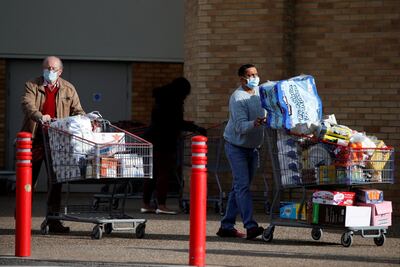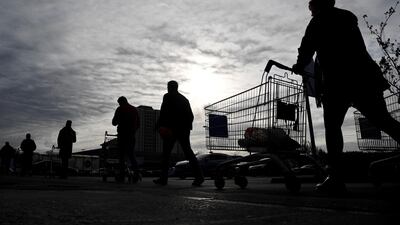UK supermarkets are under pressure as they contend with heightened Christmas demand as shoppers plan for a 'blowout' Christmas' to shake off the gloom of a difficult year caused by Covid-19.
Market researcher Nielsen forecasts UK shoppers will spend £1 billion more than usual in supermarkets this month, following a bumper November that saw grocery sales increase 10.1 per cent in the four weeks to November 28, compared to the same period last year.
Other analysts think Nielsen’s estimate is conservative with queues already forming outside outlets at peak times, as supermarkets struggle to adhere to social distancing measures and shoppers look to stock up ahead of Christmas.
“Frankly people have had enough (of Covid) and I think they’re going to have a big blowout,” said Shore Capital analyst Clive Black.

While an expected increase in December demand is not unusual, the added dimension of Brexit adds to the operational difficulties UK supermarket groups are facing, as well as Britons feeling an increasing need to indulge after a difficult year.
Demand is also beyond the normal seasonal pick-up thanks to a large proportion of the population still working from home and tightened restrictions on cafe, pub and restaurants in many parts of the country.
Supermarkets also have more mouths to feed with many of around five million Britons who normally travel abroad for Christmas staying in the UK, and the early return of university students to the family home.
While British retail sales growth slowed in November when non-essential stores shut as part of a four-week lockdown in England, the gap was filled by online sales and a surge in supermarket shopping, according to the British Retail Consortium (BRC).
Web grocery sales shot up 97.4 per cent in November from a year earlier, according to a Barclaycard survey, with supermarkets experiencing a jump of almost 20 per cent as the country stocked up early on Christmas supplies.
Morrisons outperformed the country's other big four grocers, with sales growth of 9.8 per cent over the 12 weeks to November 28, according to Nielsen.
Sainsbury's saw growth of 8.1 per cent, followed by market leader Tesco on 7.6 per cent. Walmart-owned Asda was again the laggard with growth of 5.7 per cent.
The big four, along with smaller rivals, must now wrestle with meeting a jump in demand while adhering to social distancing requirements.
Sainsbury’s, Britain’s second largest supermarket, said last week that its sales had exceeded expectations since the start of November.
“That’s why we’re working really hard to make sure that we can expand the capacity in the supermarkets, that’s why we’re asking customers to shop on their own...to make sure we can get more into the store,” said Simon Roberts, chief executive of Sainsbury’s.
Supermarkets are asking customers to shop early for seasonal products to spread volume out, encouraging them to use handheld devices that bypass checkouts. They are also extending trading hours and lobbying the government to relax strict Sunday trading laws and allow all-night deliveries.
To keep spirits up throughout December’s chilly temperatures, Asda and Sainsbury’s are trialling virtual queuing apps where customers can wait in their cars until there is room for them in store, while Morrisons and Asda have constructed canopies to protect waiting shoppers from the rain, with the latter also making 25,000 umbrellas available.
With online home deliveries accumulating and click-and-collect capacity expanding, online shopping accounts for only about 13 per cent of all UK grocery spending versus 7 per cent before the pandemic, according to market researcher Kantar. That means more than 85 per cent of the market is still in-store.
While grocery stores have benefited from lockdowns and households staying at home, other retailers, particularly physical stores, suffered during the November lockdown when shops were shut.
As a result, Christmas spending overall is on track to decline by £3bn this year with entertainment and hospitality set to lose out, according to the Centre for Economics and Business Research (CEBR).
"Travel, socialising and entertainment are bound to take a hit this year. Entertaining at home may see a bit of a downtick due to fewer large gatherings, but people will still want to mark the occasion so we would not expect a big change to the usual trends," said Nina Skero, chief executive at CEBR.
While CEBR expects retailers to benefit this month, Helen Dickinson, chief executive of BRC, said that after two lockdowns in England and a shortened Christmas trading period, many retailers are feeling the pressure in the final weeks of the year.
"’Non-essential’ retailers face mounting rent bills on top of a return to full business rates liability from April 2021. The Government must address this by extending the moratorium on debt enforcement, giving retailers and landlords more time to negotiate and extending rates relief for the worst affected businesses into next year," she said.
"Without this, parts of the industry face the stark reality of being unable to pay their bills, resulting in further job losses and store closures and setting back any wider economic recovery.”
Nielsen said there has also a redistribution of spending between city centres and suburbs as more workers stay at home, with the changing behaviour and a rebalancing of stores meaning 80 per cent of these sales now come from 19 per cent of stores.
“UK food retailers — whether large supermarkets or local corner shops — have been a lifeline for shoppers. Consumers continue to adapt their routines in line with the pandemic and many of these behaviours, such as working from home, will continue even when restrictions ease,” said Anne Haine, SVP Europe, intelligent analytics at Nielsen.
“Manufacturers should be taking a close look at their distribution strategies, while retailers review their current store formats, locations and expansion plans to better meet these new routines.”
Uncertain prognosis for retail in 2021
From January 1, shoppers face the prospect of gaps on shelves if supply lines from the European Union are disrupted following the end of the Brexit transition period.
“Beyond the Christmas trading period, confidence is likely to be fragile as the UK leaves the European Union and more shoppers feel the impact of the economic downturn,” said Susan Barratt, chief executive of IGD, a think tank focusing on the food and consumer goods industry.
With nearly one third of Britain’s food coming from the EU, grocers fear significant disruption to their “just in time” supply chains when Britain finally leaves the bloc shortly after the Christmas rush.
Delays of even a few days as post-Brexit customs checks come into force at ports could make fresh produce unsalable and in some instances lead to shortages.
__________________________
Pocketful of Dirhams
Retail isn't the only sector facing an uncertain future. The latest Pocketful of Dirhams podcast asks what's next for the swollen property market. You can listen here or below.


